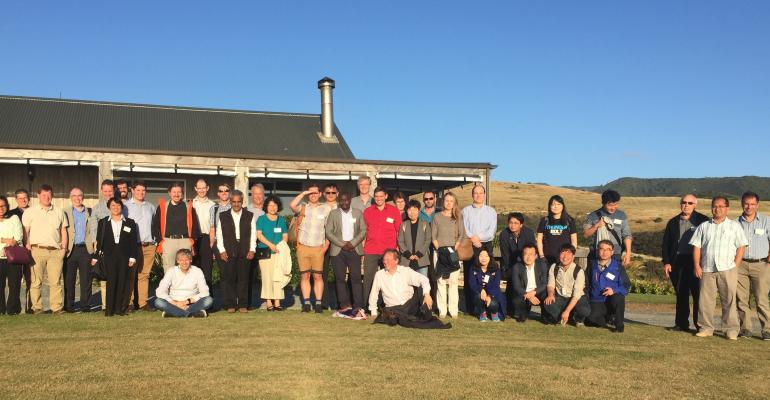- AUTHOR“Accelerating progress in global modelling”
- May 4 2017
“Accelerating progress in global modelling”

Recently, Deep South Challenge modellers met with experts from meteorological and research agencies in the UK, Australia, Korea, Philippines, India, USA, South Africa and New Zealand at a NIWA-hosted technical workshop on global climate modelling.
The Global Model Evaluation and Development (GMED) workshop held in February was an opportunity for members of the Unified Model consortium to meet for three days to discuss common issues for mutual benefit to the consortium’s members. The goals of the workshop broadly were to ‘to accelerate progress in global modelling’ (Unified Model Newsletter, February 2017).
The attendees all use the Unified Model – a powerful computer software able to numerically predict weather and model future climate scenarios.
Originally developed by the UK Met Office, the model is used by many around the world for short range and seasonal weather forecasting. It is also used for climate simulations on timescales up to centuries ahead.
NIWA employs the Unified Model for weather prediction, global and regional climate modelling, and modelling the chemistry of the atmosphere.
Sean Milton from the UK Met Office plays a leading role in how the model is technically configured. In New Zealand for the first time, he says the workshop was a milestone event in bringing together the model’s partner community – all of whom contribute to evaluating the model across different timescales.
“Workshops like these mean we’re able to tap into regional expertise in weather and climate. The global models being generated are now so big and complex that a partnership, consortium approach is needed more than ever. It’s simply too big for one agency to deal with alone.
“There are huge benefits from collaboration around diversity of ideas. The NIWA workshop was a good opportunity to have everyone in the same room talking about future strategies.”
That sentiment is echoed by Dr Olaf Morgenstern, who leads the Deep South Challenge’s Earth System Modelling and Prediction programme, who described the workshop as significant, highly focused and interactive.
Because global climate modelling is such an intricate field of study, another major topic of conversation at the workshop was systematic errors and biases in the model and how these can be remediated. The role of the Southern Ocean and its influence in the global weather system is a major motivator for the Deep South National Science Challenge, an initiative that is now actively contributing to the development of the Unified Model in its global climate configuration.
Dr Jonny Williams and Dr Vidya Varma, NIWA climate scientists who work on the Deep South Challenge, attended the workshop. Jonny said that the workshop was hugely beneficial, “So much of the work that is done between distantly separated member sites depends on personal relationships, and therefore we benefited greatly from meeting with colleagues whom we hadn’t seen recently or indeed had not met before.” He said, “As well as the personal aspects of the meeting, there were various technical advances which will assist NZESM model development.”
Vidya said discussions at the workshop were useful for identifying and managing some key challenges facing the modelling community, and reduce the barriers of working remotely and globally. “The workshop helped in emphasising the ‘Southern Ocean biases’ as one of the priorities in the future model development activities, which would be crucial for the Deep South Challenge.”
More information about The Unified Model, including how it works, can be found at: metoffice.gov.uk/research/modelling-systems/unified-model